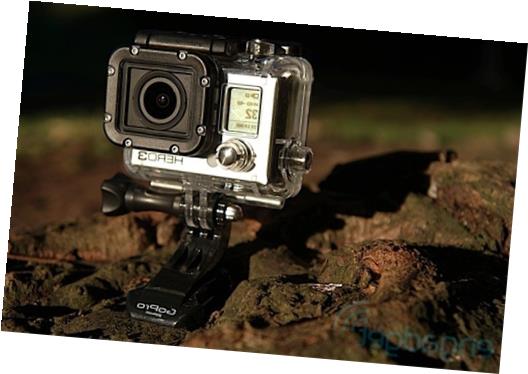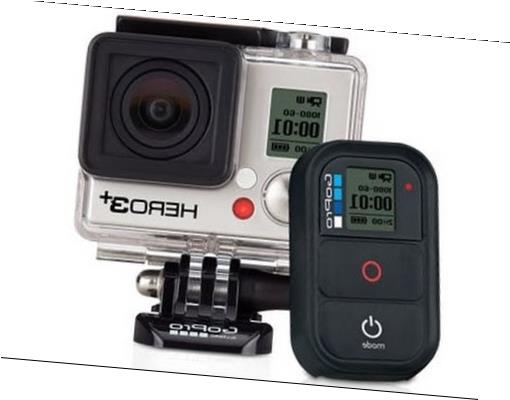
|
|
  |
|
25 Ноя. 2014 г.Экшн камеры гоу про 3 плюс обзор видеоIt delivers unparalleled resolution from a camera of its size and does so without sacrificing frame rate or field of view. With that accomplished it's simply a matter of turning on the Hero3's WiFi and connecting a handset to that network. On the left resides a small WiFi key, the microphone and a trio of pinholes that serve as an outlet for audio alerts. Should the $400 price tag of the premier Hero3 model prove too much, silver ($300) and white ($200) editions are also available. However, the lack of fine-tuned controls prevent it from becoming a camera replacement, and without the GoPro app or the LCD BacPac showing you what the camera sees, it can be difficult to frame photos.Audio recorded by the Hero3's mic is decently clear and free of distortion, and we were pleasantly surprised to find that wind noise wasn't a problem during our testing, whether the camera was in its waterproof case or not. The rear is where you'll find the battery door, which, should you manage to pry it open with your fingernails or a business card, reveals a 1,050mAh rechargeable cell. To find out, we took a Hero3 up in a jet, strapped it to the roof of a car and recorded a base jump out of a hot air balloon (from the safety of the basket, of course). 2.7K is the maximum resolution for capturing quality video -- recording in 4K is really just a novelty. And using WiFi and the LCD BacPac resulted in dramatically worse battery life -- the well ran dry in under an hour. During testing, the Hero3 performed well, as captured footage was bright and clear at all resolutions. While those expanded options are sure to be appreciated by film pros, such capabilities weren't needed for this review. Upon the advice of GoPro's boffins, we set up our camera at 1440p48 for shooting the flight portions, while the road test was shot in 960p48 -- all of our videos were shot in a wide 170-degree field of view. We highly recommend carrying around an extra battery or two ($20 bucks each) or grabbing the battery BacPac for $50 if you plan on doing all-day shoots. What's more, the WiFi, power and record buttons all have a nice, deep travel and engage with a satisfying snick. While the 5V Wall Charger's a nice luxury for world travelers with its selection of international plug attachments and dual USB output, it's hardly necessary given that the majority of us already own a USB charger or two. However, 2.7K is the maximum resolution for capturing quality video -- recording in 4K is really just a novelty. Doing so showcases the new sensor's improved low-light performance, as the Hero3 reveals more detail in shadowy and dark spaces, though that was at the expense of blowing out some other portions of shots in mixed lighting. So, no matter how you like to get your video gnar -- via super-hi-res or super-slow-mo footage -- the Hero3 Black Edition can give it to you. Before getting started, we charged up our Hero3 in a little over two hours and popped in a microSD card (not included). The original HD Hero first delivered stills and wide-angle HD video in 2009, and those capabilities improved with a higher-res sensor, faster burst mode and a wider field of view in the Hero2. That means you can start and stop recording, switch between shooting modes, change resolution and frame rate, delete pictures and clips, and even check the camera's battery status and remaining SD card space. Because the Hero3 Black Edition is an action camera, and GoPro's halo device at that, we used it to shoot some proper action, including filming from a hot air balloon, in a fighter jet and taking it for a drive through the Marin headlands just north of San Francisco. Our only complaints with the design are the size of the WiFi key (gloved or ham-handed users may find it difficult to press) and the lack of some sort of tab, notch or spring to help open the battery door. In order to see how far GoPro hardware has come, we did a side-by-side comparison shoot with the original HD Hero and the Hero3. That said, it's straightforward to use, and we were thankful for it during our testing -- like using the LCD BacPac, it's far less time consuming and easier to change settings in the app than it is cycling through and selecting options using the hardware buttons on the camera or WiFi Remote. GoPro has also released a free, self-titled app for iOS and Android that turns your handset into a remote control for the Hero3. Plus, it enables users to immediately review images, video and even audio using its tiny built-in speaker or 3.5mm headphone jack. We didn't have the dual shooters needed to create a 3D video, but we did find the software quite easy to use for trimming and adjusting our clips. Next to the door is the company's proprietary 30-pin Hero port for connecting the camera to either of the aforementioned BacPacs. Despite its meager battery life and less-than-ergonomic shape, the Hero3 provides imaging performance superior to all of its competitors at a price that won't break the bank. GoPro hasn't changed the look of its cameras much since the introduction of the original HD Hero. The beeps emanating from there tell you when the Hero3 is powered up and inform you when you've started eating up space on your memory card with photos or video recordings. The program provides basic tools to trim clip length, rotate clip orientation, adjust white balance, contrast, sharpness, exposure and saturation. The Frame mount is similarly superfluous, as it leaves the Hero3 susceptible to the destructive powers of the great outdoors in exchange for a thinner and lighter profile than the bombproof case the camera comes with. The action camera market has seen a spate of new entrants in the past year, most notably the Contour+2, which matches the Hero3's $400 price. Naturally, the case is also thinner to accommodate the svelte profile of the Hero3, though it has the same interchangeable backplate design as its precursors. GoPro provides rudimentary editing software, called Cineform Studio, as a free download on its website.  Its main purpose is to create 3D videos should users have two older Heroes and a 3D Hero System housing. First, users should upgrade the camera's firmware through the GoPro website, during which you name the WiFi network and set the password for the ad-hoc network the camera creates. The only feature it lacks, a rather glaring omission in this editor's opinion, is the ability to review photos and videos. The Hero3 also provides more accurate, if sometimes warmer, color reproduction than the original Hero as well. Such solid construction imbues a sense of confidence that it can take the abuse it'll doubtlessly receive when in the field. Well, recording using ProTune is really for filmmakers, as it encodes video at a much higher data rate (45 Mbps) and uses a special, wider-gamut color profile developed by Technicolor to provide more editing flexibility in post-production. It's like the old model, except the lens window is flat and square (for reduced image distortion) instead of domed and round, while the latch that holds it closed is a dual-hinge articulating design that's more secure than the previous model. Other options include Sony's Action Cam, a $200 option that significantly undercuts the Hero3 on price while packing 1080p recording and WiFi in a similarly small device. Both top out at 1080p recording at 30fps, with lesser frame rate recording at lower resolutions than the Black. However, the Sony can't match the Hero3's resolution, frame rates or general imaging performance. Not only does this make the camera easier to hold, but it also provides a nice visual contrast -- not to mention it's a finish that'll hold up better to the rough and tumble lifestyle most Hero3's will lead. Naturally, should you wish to use an external mic, GoPro offers a 3.5mm to mini-USB adapter sold separately for 20 bucks. We also did our shooting using GoPro's standard settings, though recording using the ProTune format is also an option. The latter issue is particularly vexing as the camera's meager battery life had us swapping cells during lengthy shoots, a shortcoming discussed in more detail below. The LCD BacPac is quite the useful add-on, however, as it lets you change camera settings more easily than using the cam's buttons. However, the +2 is a much larger camera, and provides lesser recording capabilities than the newest GoPro. Instead, it's coated in smooth soft-touch black plastic on the back and a textured version of the stuff on its sides. Drift and ION are other options that provide 1080p recording in barrel-shaped shooters for $370 and $350, respectively, but they lack the Hero3's higher-resolution and high-frame rate capabilities. Prior Heroes are silver boxes with stubby fisheye lenses jutting out next to a 2-centimeter monochrome LCD display on the front. Swapping backplates isn't terribly difficult once you get the hang of it, but the amount of torque required to pop them in and out is somewhat disconcerting -- it's foreseeable that one could snap off a plastic mounting clip in the process. It gives users higher resolution and higher frame rate options than the competition, but its battery life leaves much to be desired. Stills are also limited to a max of 11 megapixels in the Silver Edition and 5 megapixels in the White Edition. Additionally, we didn't find the battery meter to be particularly useful, as the three bars provide only a vague impression of the amount of juice left. These lower-priced models don't come with the WiFi remote, which costs $80 on its own, and also have downgraded lenses and sensors. In addition to the standard Black Edition kit, we also got to use GoPro's $40 wall charger, $40 Frame mount and $80 LCD touchscreen BacPac. Once connected, the app provides both a real-time preview (on about a 1.5-second delay) of the camera's field of view and a full suite of controls for the Hero3. While the results produced by the GoPro were some of the best we've seen from an action camera, its battery life leaves something to be desired. The Hero3 provides higher frame rates at all resolutions, records usable video at up to 2.7k resolution with a 170-degree FOV, while the Contour maxes out at 720p to deliver the same FOV. GoPro claims that the Black Edition's lens is twice as sharp as previous GoPros, and the upgraded sensor provides improved low-light performance. GoPro's Hero3 Black Edition is, put simply, the most capable action camera on the market today. Now, GoPro has rolled out the Hero3, which packs even greater performance (up to 4K video!) in a cube that's almost a full centimeter thinner than its predecessors. Aside from being thinner than its predecessors, however, the Hero3 is no longer clad in all silver. GoPro's lineup of mount-anywhere cameras has been dazzling extreme sports enthusiasts for years. GoPro says the remote works up to 600 feet away in "optimal conditions" but in our clearly less-than-optimal neighborhood, range was limited to about 120 feet. Its diminutive 1,050mAh cell lasted us half a day during intermittent use (fiddling with settings, shooting pictures and video, and repeated power cycling). The camera performed similarly well when shooting stills, providing bright, vibrant wide-angle shots.  |

 Gopro 3 black характеристики
Gopro 3 black характеристики